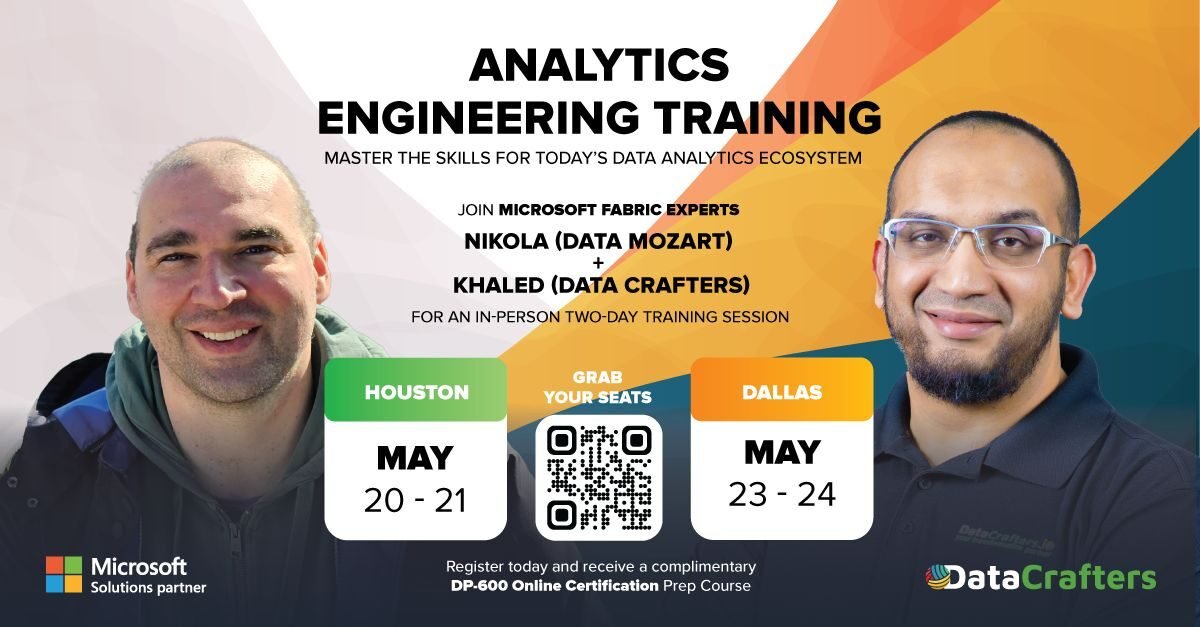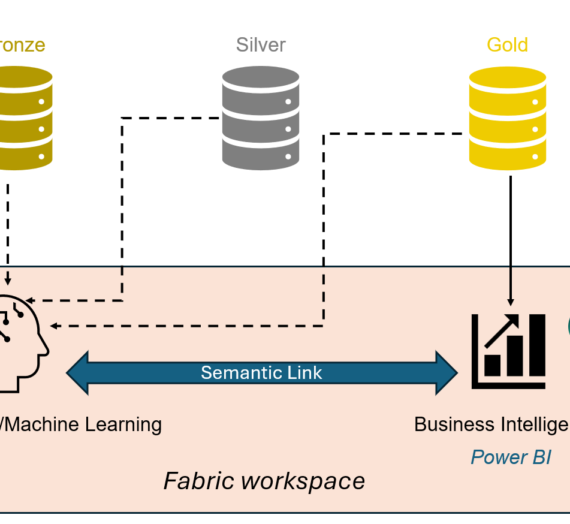Have you ever dreamed of becoming an Analytics Engineer and mastering the most in-demand skills in today’s data analytics ecosystem?
I’m beyond excited to share some great news: this May, I’ll be joining forces with amazing people from Data Crafters to teach prospective analytics engineers everything they need to know to successfully complete the DP-600 certificate (Microsoft Fabric Analytics Engineer Associate)! If you are near Houston or Dallas area, join us for live, in-person 2-day training:
- Houston, May 20 – May 21
- Dallas, May 23 – May 24
If you are not sure what the DP-600 exam is all about, please refer to this post, where I shared my experiences about taking (and passing, yaaaaay) this exam!
Why should you join us in this training?
This training will boost your career opportunities in the analytics realm, while at the same time setting you ready for acquiring the popular DP-600 certificate (Microsoft Fabric Analytics Engineer).
Microsoft Fabric is currently the “hottest” topic in the data analytics world! It’s not a coincidence that Satya Nadella (Microsoft CEO) labeled Fabric as “the biggest data product after SQL Server in Microsoft history”. And, Analytics Engineers are currently the most in-demand professionals in data analytics.
This training is a perfect blend of these two – providing you with skills necessary to succeed as an Analytics Engineer, and teaching you how to practically apply these skills by using Microsoft Fabric!
By the end of this training, you should have a skillset to successfully design, implement, and manage complex data analytics workloads, and feel more comfortable taking the popular DP-600 exam (Microsoft Fabric Analytics Engineer).
Please keep in mind that this is NOT a deep dive into each and every component of Microsoft Fabric. The focus is on concepts and components relevant to analytics engineers.
Who should be joining this training?
If you are a BI Analyst, BI Developer, Data Engineer, Analytics Engineer, or Business Analyst, and want to expand your skills in the Microsoft Fabric realm and feel more confident in taking the DP-600 exam, YOU are the right person!
What’s in for you?
You’ll enjoy (hm, hopefully, enjoy) 2-day of intensive learning (but, we’ll also have a lot of fun, I promise) and hands-on work to shape your analytics engineering skills.
Day 1
1. Introduction and setting the right expectations
2. Microsoft Fabric core components
- Fabric – unified platform, tools, people who work with Fabric
- Understanding OneLake
- Understanding different Fabric engines
- Delta format as a key pillar of Microsoft Fabric
3. Prepare and serve data in Microsoft Fabric
- Creating Fabric items
- Create a lakehouse and/or a warehouse
- Ingest data with notebooks, pipelines, and Dataflows Gen2
- Create and manage shortcuts
- Understand file partitioning
- Create views and stored procedures
- Data orchestration
- Understand methods to copy the data from the data source to Fabric
- Implement data orchestration with pipelines
4. Data modeling
- Understand basic dimensional modeling concepts
- Facts vs dimensions, including special types of dimension tables (SCD)
- Normalization and denormalization
- Aggregating data
- Implement a star or snowflake schema
5. Data transformation
- Implement data cleansing
- Data profiling with notebooks and Dataflows Gen2
- Enhancing models with additional columns
6. Performance optimization
- Identify data loading performance bottlenecks
- Implement performance optimization techniques in Dataflows and notebooks
7. Hands-on lab
- Create a lakehouse in Microsoft Fabric
- Ingest data into Lakehouse with Dataflows Gen2 and notebooks
- Denormalize flat table to a Star schema
- Enrich the semantic model with additional columns
- Implement data cleansing
Day 2
- Design semantic models
- Understand different storage modes (Import, DirectQuery, Direct Lake)
- Understand the difference between default and custom semantic models
- Enhance semantic models with DAX calculations
- Implement advanced semantic model features, such as Calculation Groups and Field Parameters
- Implement composite models with Power BI aggregations
- Implement and validate RLS and OLS
- Optimizing semantic model performance
- Troubleshoot poor-performing DAX queries with DAX Studio
- Optimize semantic model with Tabular Editor 2
- Implement Incremental refresh
- Explore and analyze data
- Apply descriptive analytics in Microsoft Fabric
- Understand T-SQL window functions
- Query data in the lakehouse by using notebooks
- Query data in the lakehouse/warehouse by using T-SQL
- Query data by using XMLA endpoint
- Understand and manage the Fabric environment
- Understand settings in the Fabric Admin portal
- Understand workspace roles and permissions
- Fabric licensing options
- Implement and manage version control for the Fabric workspace
- Manage and deploy semantic models by using XMLA endpoint
- Hands-on lab
- Create a custom semantic model
- Create a Power BI report in Direct Lake mode and enhance it with DAX calculations
- Use DAX Studio to identify issues with DAX queries
- Use Tabular Editor 2 to apply improvement options
- Connect to Fabric Lakehouse and perform exploratory analytics by using notebooks
- Connect to Fabric warehouse and write T-SQL queries to use window functions
- Summary, Quiz, and Q&A
- Training wrap-up
- Grande Quiz (15 questions with prizes for the top-performing participants)
- Q&A
- Where to go from here
- Practical tips for taking the DP-600 exam
That’s not all folks – Bonus!
Our mission to get you ready for successfully passing the DP-600 exam doesn’t end once you finish the training. We prepared additional resources to keep your skills in the right shape. After the training, you’ll get access not only to all materials we’ve used during these two days (presentations, demo files, notebooks, etc.) but also FULL ACCESS to the on-demand “Mastering DP-600 course: Microsoft Fabric Analytics Engineer” that I’m currently working on! This bonus package alone is worth more than $500!
Looking forward to seeing you all in Houston and Dallas this May!
Last Updated on March 21, 2024 by Nikola




